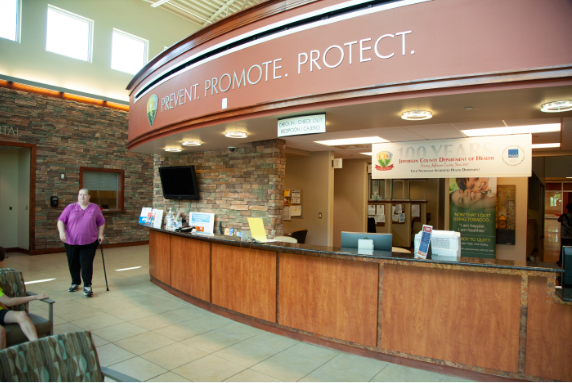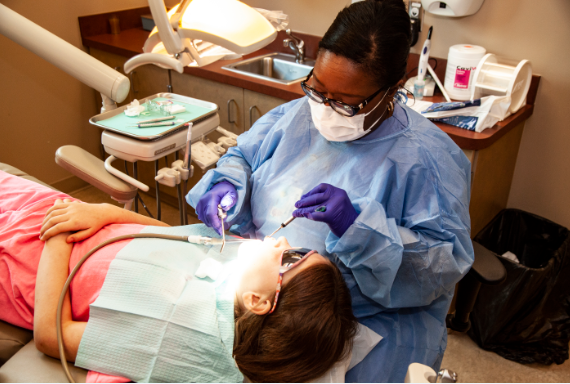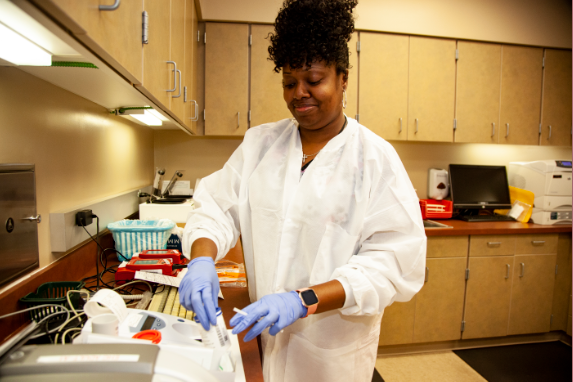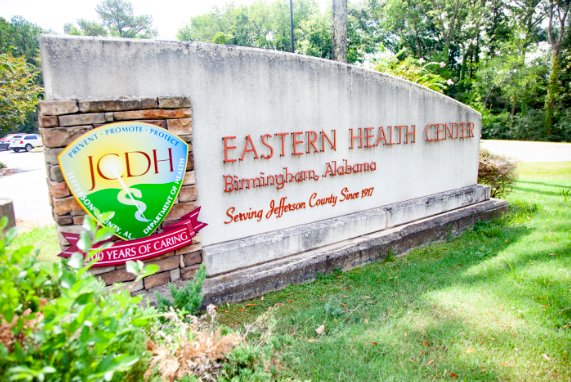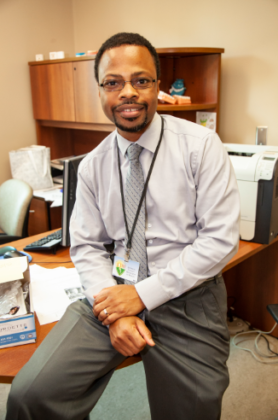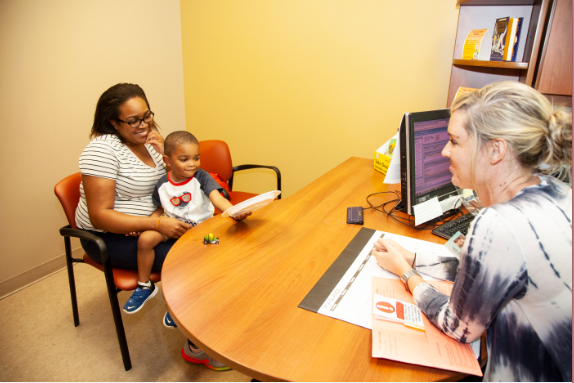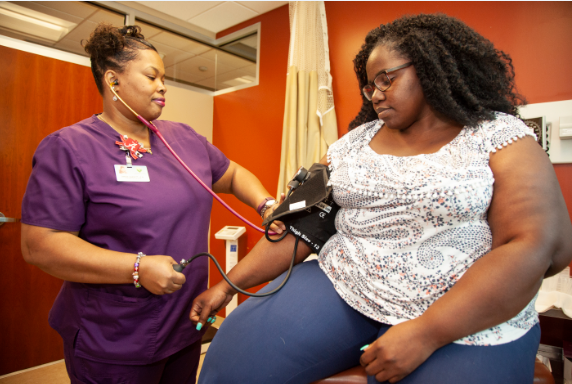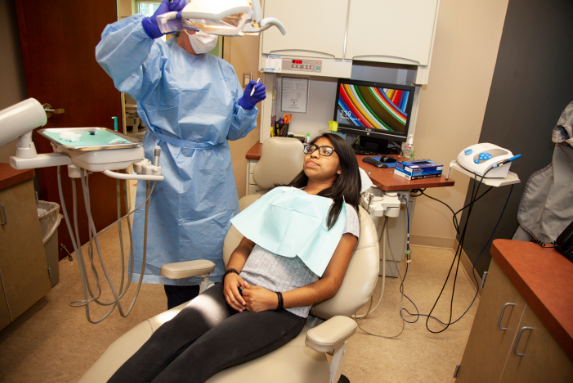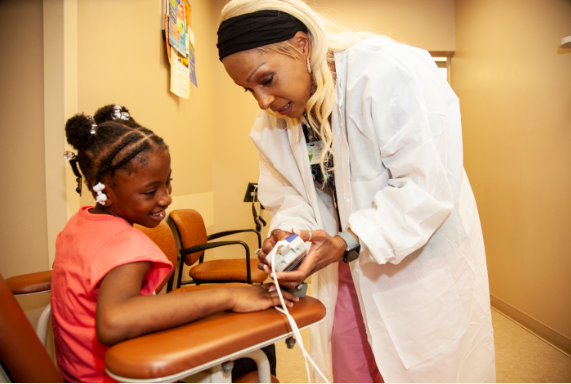
By Erica Wright
The Birmingham Times
On a recent fall afternoon, the waiting area in the Jefferson County Department of Health (JCDH) Eastern Health Center is filled with patients. Still, JCDH Deputy Health Officer David Hicks, MD, has carved time out of his busy schedule to greet The Birmingham Times for a tour of the center and to discuss the range of services in place to make the county a healthier place to live, work, and play.
The JCDH has three main locations: Central Health Center (Guy M. Tate) at 1400 Sixth Ave. South; Eastern Health Center at 601 West Blvd. in Roebuck; and Western Health Center at 631 Bessemer Super Highway in Midfield. The facilities offer programs and clinics related to dental, family planning, maternity, pediatric, and primary health care, including routine exams and sick visits for adults 19 and older, among other services.
Join Hicks and The Birmingham Times for a walkthrough of the Eastern Health Center.
Dental
First stop: the dental clinic. A hygienist is sitting at the front desk with several dental chairs and utensils nearby. In a smaller room, a young girl goes through the final part of her checkup. Lisa Eich, DDS, checks the girl’s teeth.
In addition to providing comprehensive dental care, the Eastern Health Center team teaches parents the importance of oral health for children.
“One thing I love about the JCDH clinics is that it’s like home-based care,” Eich says. “When patients come to our centers, we can provide not only dental care but also family planning services; pediatric and adult care; and information about [the federal Special Supplemental Nutrition Program for Women, Infants, and Children (WIC)]. It’s fun to be a part of a team like that.”
The dental clinic provides general care, such as regular teeth cleanings and X-rays to patients primarily under the age of 21; about 15 to 20 patients are served each day.
WIC
Next stop: the University of Alabama at Birmingham (UAB) maternity clinic housed in the center; it is available through a partnership with the UAB Department of Obstetrics and Gynecology and provides prenatal care for women. Nearby are the WIC offices where we meet Liza Koepsel, RD, one of the center’s nutritionists.
“We serve pregnant, postpartum, and breastfeeding women, as well as their children, … infants up to age 5. We check in with [the mothers] nutritionally every six months during pregnancy,” Koepsel says.
As for babies, “from infancy to age 5, we check their height and weight to make sure they’re growing like they should,” she says. “We have tips for diet and lifestyle changes for kids and adults, but there’s a lot of education-based nutrition.”
Along with Koepsel, three other nutritionists work with mothers and their children on the importance of a healthy diet, a healthy pregnancy, and a healthy lifestyle. WIC—a program funded by the government that provides fruits and vegetables, dairy products, and whole-grain foods to women and children—is one of the services often discussed.
WIC bridges the gap between the underinsured and insured because “nutrition is a big issue with a lot of health problems and chronic diseases, so we’re trying to get the word out” before kids from infancy to age 5 develop unhealthy habits, Koepsel says.
“WIC supplements the good stuff,” she adds. “[It’s] not like food stamps, through which a person gets a certain dollar amount. … [WIC] ensures that [women and children] get healthy foods, know how to use healthy foods, and know how to buy healthy foods to … make sure they do well nutritionally.”
The Eastern Health Center’s nutritionists serve about 13 to 20 people a day and about 1,000 people a month.
Family Planning
Next up: the family planning area, where women can get contraception counseling, pregnancy testing and exams, as well as condoms, birth control, and feminine products. Nurse Practitioner Katie Fox is stationed here.
“I think it’s important for women to be aware of their health. We’re teaching them how to take care of themselves and what they need to look for. It’s important to have a place where they can trust their nurses and providers,” she says.
“This is a place where [patients] can come and have a provider who can answer questions. … We always encourage women to come here, … not only you but your mother, your sister, your daughter, anyone.”
The family planning staff focuses on more than contraceptives; they provide valuable information about other aspects of women’s health, such as cancer screenings, breast exams, pap smears, and testing for sexually transmitted diseases (STDs).
The clinic has about 17 appointments a day and an unlimited number of walk-ins; it serves girls and women, ages 12 to 55.
Pediatrics
Last stop today: the pediatric clinic. Inside, a mother holds her baby as the nurse checks him out and prepares to give him his shots.
“In the pediatric clinic, children can get all of their preventive vaccinations, their wellness visits and screenings. We screen for lead poisoning, for different metabolic disorders,” says Hicks. “We do what is called anticipatory guidance, that is, teaching parents what they can expect in the development of their children, as well as how to address childhood safety and bullying. We try to prevent things from happening.”
The pediatric clinic, staffed by board-certified pediatricians, offers primary health care, including routine exams and sick visits; it serves children from birth through 18 years of age.
Even More
As the tour comes to an end, there is more. In the main area of the center are social workers and interpreters. At one desk, a social worker speaks with a resident about health services. At another, an interpreter speaks with a Hispanic couple who just walked in with their newborn.
“We have employed interpreters, so when [visitors] come to our front desk someone serves as a translator, speaking to them in their language even their dialect. … Several of our interpreters speak multiple dialects of Spanish,” Hicks says.
Before wrapping up with The Birmingham Times, Hicks makes it clear that all JCDH centers allow people to get health screenings without having to worry about the cost.
“We see everyone, no matter their ability to pay. If [someone does] have financial issues, we reduce our fees for service to ensure that our patients have access to high-quality care.
“We have partnerships and relationships with other institutions where we can refer patients if we can’t do [something] in house. We try to do everything here if possible, [though]. … We meet people where they are, so they don’t have to go broke just to get health care.”
For more information, visit www.jcdh.org.
Click here to read more stories about health: All of Us; ARMS; Black Lung.

